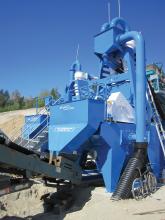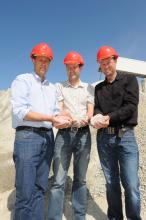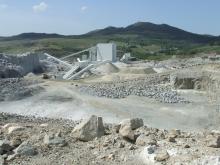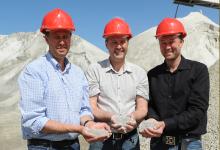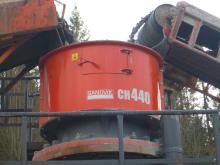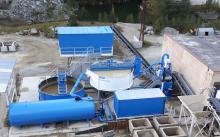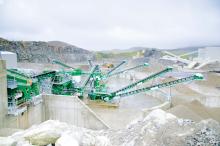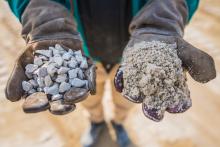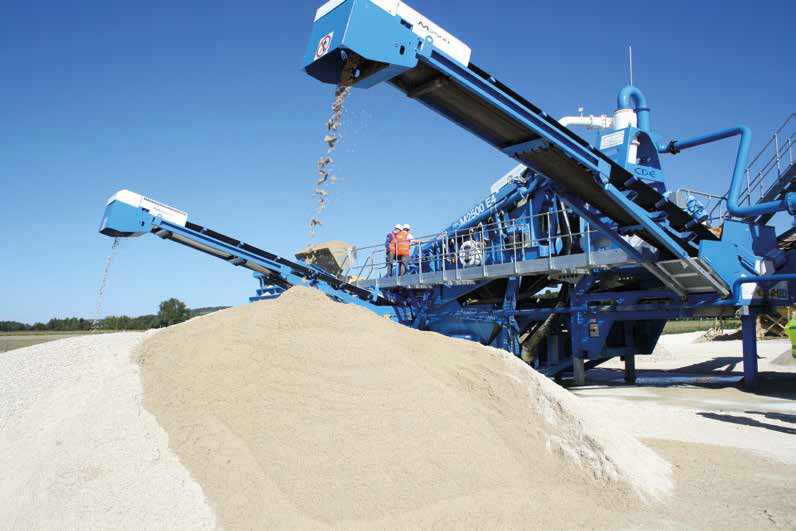
Ølen Betong AS was established in 1974 following the signing of an agreement of cooperation between Berge Cementstøperi and Sunnhordland Støperi og Bygg.
These companies ceased to exist in 1977 with
The Ølen Betong Group now consists of several companies, and is now one of the biggest manufacturers of Ready-Mixed concrete, precast elements and concrete products in Norway. Additionally the company is now, through its subsidiary Nor Aggregates, a major producer of aggregates in the country, both for its own use in concrete and cement manufacturing, and for supply to the Norwegian construction industry. Annual company turnover is now approximately NOK 1.5 billion and employs in the region of 450 employees.
Ready-Mixed concrete production and supply has been one of Ølen Betong’s most important business areas right from the start of the company, with various plants located throughout the country supplying the Norwegian construction industry. The 1980s saw a significant investment in mobile mixing plant which could be moved quickly and assembled for the production of Ready-Mixed concrete directly at large construction sites.
The first such project was the Kårstø development, and in the years that followed, the mixing plants were in use at the biggest developments throughout the country. These included the Snøhvit development (LNG), OPS E-18, Hundvåg and Ryfast road and subsea tunnel construction project, airport hangars, hydroelectric power stations and dams, bridges as well as other tunnelling projects throughout Norway.
In 2001, the company took over a concrete mixing plant at Stord as well as establishing a large mixing plant in Bergen. In 2002, Ølen Betong further boosted its production capabilities with two mobile and one stationary mixing plant located at Hammerfest. This was specifically for the purpose of providing materials for the Snøhvit LNG project at Melkøya in Finnmark. By the end of 2016, concrete production is on-going in 26 Norwegian locations as well as one in Murmansk, Russia.
Investment in tunnelling
In recent years Norway has seen a large amount of road and tunnel construction in order to improve links between communities, and effectively straightening major highways. One of the most ambitious projects to date was the Ryfast project which included the driving of the new 14.3km Ryfylke or Solbakk twin road tunnels. The estimated cost of the project is NOK 6 billion (€700 million) which will also involve the construction of 53km of new roads, many of which will see further tunnelling. The twin road tunnel will, when completed, be the world’s longest and deepest undersea road tunnel, with Ølen Betong having supplied a staggering 340,000m3 of concrete for the tunnel linings.
An even more ambitious program of tunnelling is due to extend the E39 main road north of Stavanger via several other islands heading towards Bergen, Norway’s second largest city. This will include an even longer undersea tunnel section – the Rogfast tunnel – which started in 2015 and aims to be completed by 2022. The Rogfast tunnel is conceived as a 25km connection below Boknafjord and Kvitsøfjord, which will upon completion set another world record for a subsea tunnel system with respect to length, and maximum depth (380m below sea level). The cost of the project was estimated in 2010 to be €500–600 million and will see 17.7km of new highways, including 14.7 km of tunnels.
Ølen Betong’s has played an important role in ensuring the success of these operations in providing the shotcrete for the tunnel linings, as well as increasingly providing aggregates for the highways, with this work having gone to a large extent unheralded. What is unique has been the source of the material used; although a great deal has come from traditional sources (including Ølen Betong’s own granite quarries) much has resulted from the newly developed crushing and screening techniques developed by Ølen Betong in partnership with contractors. This has seen the company manufacture artificial sand from rock, often using aggregate from tunnel excavations. Three different sites show how Ølen Betong has adapted screening and crushing equipment to deliver economical and environmentally friendly solutions for a variety of applications.
The first such site is located at Fana, Bergen, where tunnel excavated rock from the Ryfast project is being used to manufacture aggregates and artificial sand. The excavated tunnel rock initially has its shape improved followed by processing through a washing plant to remove the surplus fines. The granite/gneiss 0-16mm feed material is processed to produce 0-4mm, 4-8mm and 8-16mm products, which are then used to replace 75-100% of naturally occurring sand in order to manufacture shotcrete for use on the E39 highway tunnel project in Bergen. Already Ølen Betong has supplied 120,000m³ of ready-mixed concrete, 160,000m² tunnel lining elements and for the new Ulriken railroad tunnel, 80,000m³ of Ready-Mixed concrete as well as 3,892 invert sleepers.
The equipment used to process the aggregate is an Ore Sizer OM80 200Kw VSI, a
At the Ølen Betong Sveio factory locally occurring granite/gneiss is considered to be a high quality rock. Through using conventional crushing and processing through a VSI (vertical shaft impactor) the company has been able to reduce its reliance on naturally occurring sand through using a mix of crushed and natural concrete aggregates. The manufactured material is in many ways an improvement on the naturally occurring sand. This is due to the fact that manufactured sand possesses significant benefits to the naturally occurring form as it originates directly from high quality virgin rock, and thus contains very few, if any, contaminants.
There are also significant advantages to be gained from the cubical shape of the end product produced during manufacture, which further provides advantages during cement and concrete manufacture, and hence benefits the construction industry as a whole. This has proved especially valuable in the production of concrete products, as during the concrete production process there needs to be very little altering of the amount of water or cement required during specific stages, thereby making the process far more cost effective. Additionally, the cubical shape of the manufactured sand gives greater strength to the final concrete product.
This improved manufactured sand is produced with the 0-200mm source aggregate being initially fed into a Powerscreen Maxtrack 1500 cone crusher. The resulting material is then fed into a VSI (in this case, a UV320 from
Along with the above solutions, naturally occurring sand is being used at Brekka. However, even this source material has benefitted from the attention of Ølen Betong. The sand found in the area possesses large amounts of clay and is contaminated by fines. Through using a CDE M2500 mobile washing plant and an Aquacycle A400 sediment tank, the 0-30mm granitic sand is turned into a high quality end product.
Through its involvement in high profile infrastructure projects such as Ryfast Stavanger, the E18 and E39 highway projects, and the Ulriken TBM tunnel in Bergen, Ølen Betong is now seen as one of Norway’s leading concrete and cement suppliers. What has made the company’s offering unique is the way in which it has used material from tunnel excavations as well as freshly quarried material, to provide a readily available economical and environmentally friendly resource for the projects.

